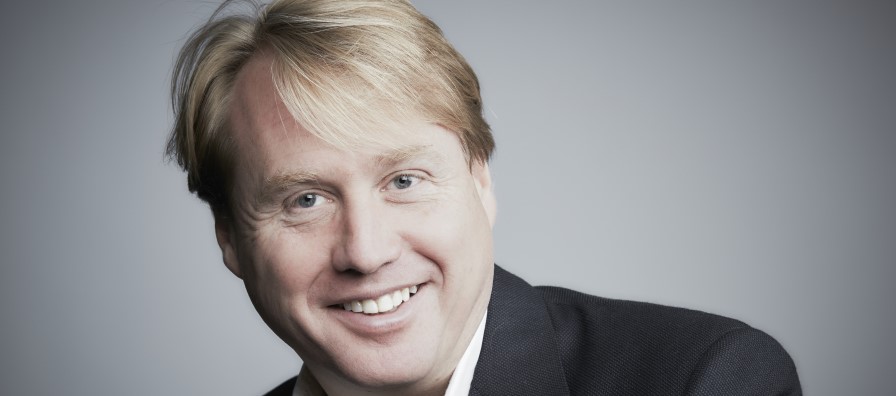🕒 Article read time: 4 minutes
In profile: Jo Bamford, Chief Executive, Wrightbus

As the grandson of the founder of the JCB empire, it was perhaps inevitable that Jo Bamford would have vehicle engineering running through his veins.
“My first job was bolting engines together at Perkins when I was 16,” he said. “My shift would start at six o’clock in the morning and I’ve spent my whole life working in manufacturing, predominantly for construction equipment.”
POWER SHIFT
While he retains an interest in JCB, which he calls “the family business”, he ended his day-to-day involvement four years ago to set up Ryse, a company which provides a hydrogen refuelling service to buses. What attracted him to this particular segment of the transport industry?
“When it comes to zero emissions,” he said, “I think fundamentally the most difficult thing to change is human behaviour. How do you find a solution that replicates what we do today? I think hydrogen is that solution. In time it could be 100% green. I’ve been looking at hydrogen for about 15 years and about three or four years ago decided to jump in and look at driving that.”
FROM FUEL TO MANUFACTURING
Last autumn, Bamford’s Ryse business had a contract with Transport for London (TfL) to supply buses in London, which it was going to order from Wrightbus, a bus manufacturer based in Northern Ireland. Unfortunately, despite having almost a third share of the new UK bus market, Wrightbus went into administration, so Bamford took the decision to acquire the business and “solve TfL’s problem”.
Wrightbus is believed to be the only remaining British-owned bus maker. However, Bamford rejects the suggestion that his aim in buying Wrightbus was to save the British bus manufacturing industry from extinction.
“I don’t think it’s about saving anything, really,” he said. “It’s about trying to find a solution for our customers and hopefully delighting them along the way. That’s really what we’re trying to do.”
CLEAN AIR AGENDA
The expansion of the Ultra Low Emission Zone in London and the introduction of Clean Air Zones in cities across the UK is clearly driving local authorities to accelerate their procurement of alternatively-fuelled buses, but Bamford thinks that tells only part of the story.
“The reality is that we need to decarbonise, that’s where the world is going and if we can stop pollution coming out of vehicles, then I think that’s a good thing,” he said. “If we can make it cost the same and do the same, I think that’s a great thing.
FUEL OF THE FUTURE?
Bamford’s commitment to decarbonisation is clear, but what convinced him that hydrogen is the fuel of passenger road transport, rather than battery?
Bamford points out that a battery bus will do 60% of the distance of a diesel bus and take four and a half hours to charge up. A hydrogen bus, on the other hand takes seven minutes to fill up and does the same distance as a diesel bus.
“As a bus operator, do I want 40% more buses?” he asks, “No not really. I also think that hydrogen is quite a clean way of doing it, particularly if you make it from electrolysis connected to green energy. The grid at the moment is 30% decarbonised so by its nature is quite dirty and batteries aren’t very clean ultimately. The world only recycles 5% of its batteries and they end up as toxic waste in landfill sites, so I don’t think that’s a great solution.”
CLOSING THE PRICE GAP
At present, however, there is a wide price differential between the cost of making the different types of buses, with hydrogen and battery buses being roughly twice as expensive as diesel buses.
Bamford maintains that he can already deliver hydrogen as a fuel at the same cost of running a bus on diesel. “But if the bus is twice as expensive, how do we change that?” he said, “Well there’s 40,000 buses in the UK, if you gave us, a single manufacturer, an order for 3,000 buses, at the end of 3,000 buses we can get the bus to cost the same as a diesel bus. At the end of that it’s going to cost the same, if the fuel costs the same and it does the same. I think we can see a mass price reduction.”
GETTING GOVERNMENT BACKING
While the market will ultimately decide which fuel source will prove to be the winner in the race to replace diesel, Bamford believes that it is imperative that the government stands four-square behind hydrogen.
“In a post-COVID and Brexit world, we are as a country going to need things to hang our hats on,” he said. “When it comes to energy and zero emission energy, I think we need to have a seat at that table. You talk about batteries, China has 73% market share of batteries, so I would say that seat at the table has already been taken and it’s incredibly difficult to get any market share when someone’s already got 73%. So I think as a country we should jump straight into getting hydrogen going.”
Bamford has agreed to speak at the upcoming Future Logistics Conference on 13 November in a session exploring Future Vehicles and Future Fuels. What does he hope conference delegates will take away from this session? His response is characteristically clear and succinct:
“That hydrogen is a viable option and at this point in time it’s ready to go.”
*https://www.wrightbus.com/
Published On: 29/10/2020 15:35:37

Comments Section
If you are a Logistics UK member login to add comments.